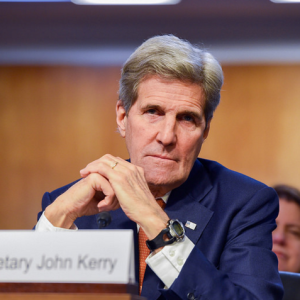Secretary of State John Kerry is about to go before the House Foreign Affairs Committee to discuss his budget request. While the Middle East will be the main focus, Kerry needs to stress that strong democracies are in America’s vital interest — especially in Africa, the next breeding ground for terrorism.
Last year, Kerry promised to “shape history” and there’s no better way to do that than by promoting democracy and the rule of law. Unfortunately, in Africa today, some leaders are making a mockery of democratic values, and the continent is moving in the wrong direction. Women’s rights are being trampled, children’s access to education is limited, and hope for families to ascend to the middle class is being extinguished.
There are some bright spots. A year ago, a challenger defeated a sitting president via the ballot box in Nigeria, Africa’s largest country by population. The losing incumbent in the March 28 election, Goodluck Jonathan, graciously conceded defeat to Muhammadu Buhari, offered his best wishes, and urged supporters to follow “due process.”
Yet in much of Africa, democracy remains an empty word. The phrase that U.S. diplomat Edward Djerejian coined in 1992 — “one person, one vote, one time” – is more the rule.
A good example is what happened last summer in Burundi, when Pierre Nkurunziza insisted on ignoring the constitution and running for a third term last year, touching off a violent reaction that continues.
This year, more than a dozen presidential elections will take place across Africa. Last weekend in Uganda, President Yoweri Museveni extended his 30 years in office in a disputed vote. His main opponent is reported to be under house arrest. It looks like a difficult year in Africa, but the United States can lead in reversing a disturbing trend.
The U.S. is uniquely able to guide young African democracies towards security and longevity. At the center of many of the upcoming elections are several presidents who are seeking to extend their terms in office, like Mueveni has done. These attempts violate President Obama’s call to end “presidencies for life.”
In Rwanda, a constitutional amendment was pushed through to allow President Paul Kagame to run for a third term, and in the Democratic Republic of the Congo, President Joseph Kabila, who has already served 15 years, is delaying elections in an attempt to extend his rule beyond what the constitution allows. Congo should be ground zero in the movement to secure democracy. It’s largest country in Africa by area. It is resource-rich and critical to the global war against terror.
Those in the forefront of resistance to these “presidents for life” are the youngest members of civil society. They’re calling for a generational change that we should be helping.
How? African leaders need to know that, if they ignore their own laws, they and their henchmen will be sanctioned by the United States. They’ll lose the ability to travel here, store their cash here, and move their assets to the safety the U.S. provides.
The U.S. also needs to provide African nations with the financial support that free elections require. The investment in democracy will pay off. Africa will become more prosperous; the U.S. will win the right kind of friends; and the world will be safer. Africa is not the Middle East. Already, the structures of democracy exist in more than half the nations. The problem is abiding by the rule of law.
In the past, President Obama has made it clear that a democratic Africa is a priority. Secretary Kerry should make that point emphatically before the House committee – and back up the sentiment with real action.

